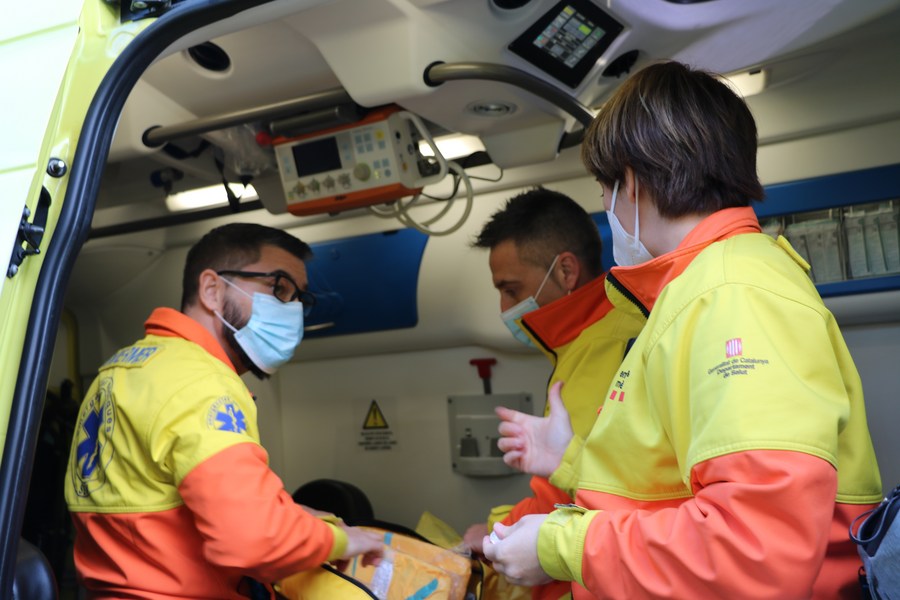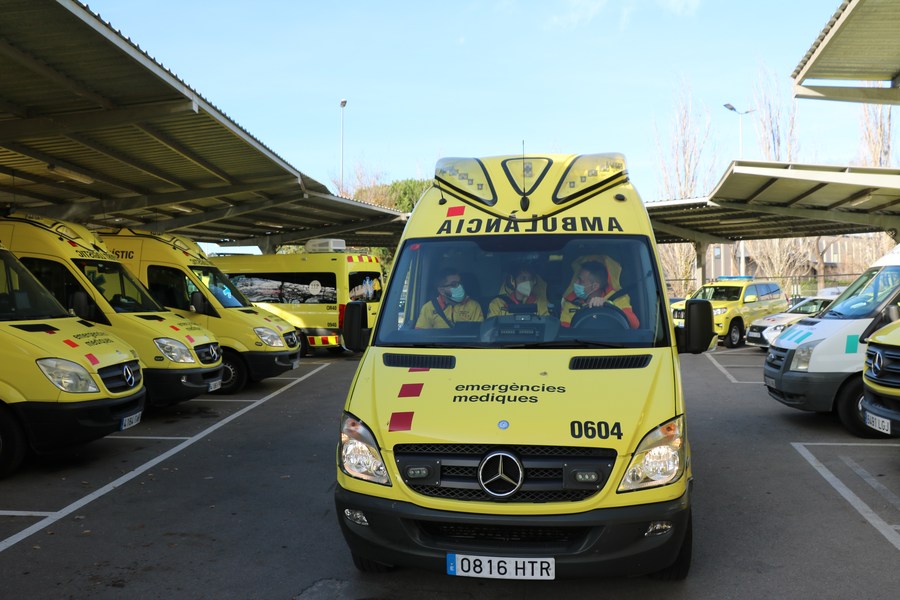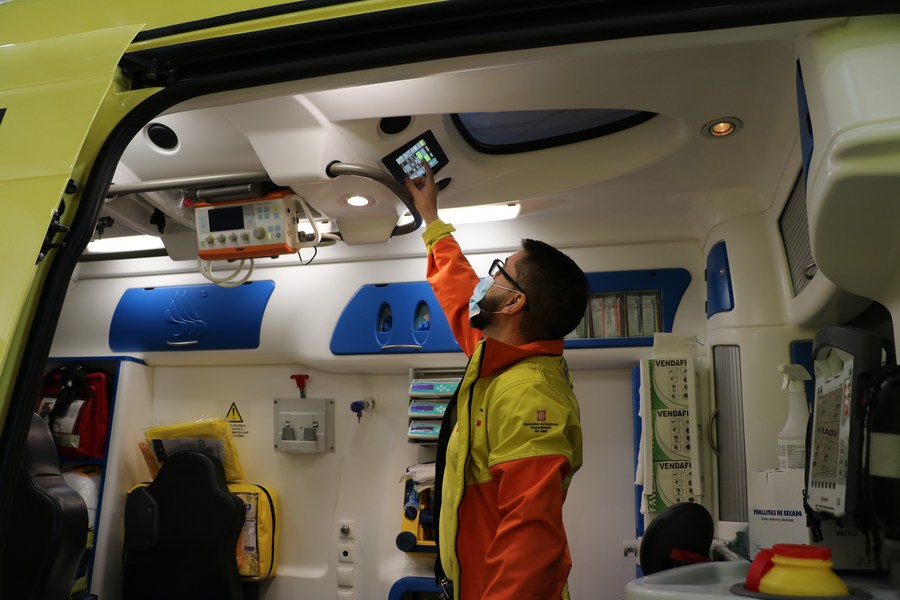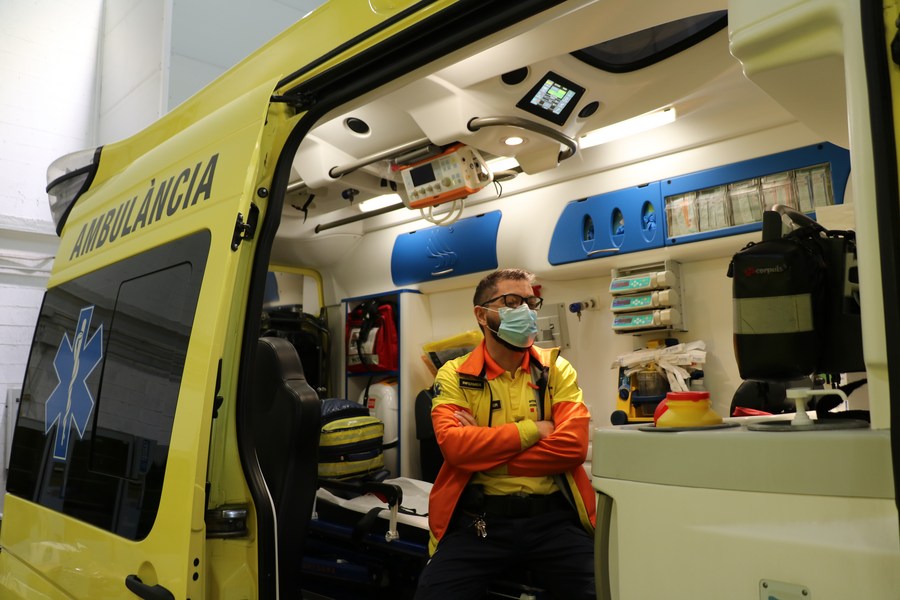
Ramon Pedrosa (L), an ambulance nurse for Catalonia's SEM emergency medical service, prepares materials inside an ambulance in Barcelona, Spain, on Dec. 22, 2020. (Photo by Ismael Peracaula/Xinhua)
"The most difficult part was isolating at home. I have young children, and being unable to hug your children or your wife for such a long time, only have to do video calls in the home, was really hard," said the ambulance nurse about his recovery period from COVID-19.
BARCELONA, Spain, Dec. 25 (Xinhua) -- When the COVID-19 pandemic hit Spain in March, the country's ambulance services became the tip of the spear. Ambulance crews have been pushed to the limit attending an unprecedented number of requests for assistance.
Ramon Pedrosa, an ambulance nurse for Catalonia's SEM emergency medical service, is among those frontliners battling the disease.
"At the beginning, there was an exponential rise in our work because the demand went up a great deal from the public due to the concerns," said Pedrosa, who has spent more than 20 years working for the SEM.

Ramon Pedrosa (L), an ambulance nurse for Catalonia's SEM emergency medical service, leaves for assistance with his team in Barcelona, Spain, on Dec. 22, 2020. (Photo by Ismael Peracaula/Xinhua)
There are over 300 organizations in Spain providing healthcare transport services, according to the sectorial watchdog DBK. Pedrosa described those first weeks of the pandemic as a time of uncertainty, during which ambulance crews had to update their working methods daily as new information and protocols reached them bit by bit.
He also talked about a general feeling of distress that was prevalent in those early days, although the fear felt by health professionals was mostly for the safety of their loved ones.
"At first there was the fear that we health workers felt when we finished work and had to go home... that we might infect our families," he said.
In fact, it was a concern that proved well-founded, as Pedrosa got infected in late March. After two days in hospital, he was forced to spend 40 days off work.
"The most difficult part was isolating at home. I have young children, and being unable to hug your children or your wife for such a long time, only have to do video calls in the home, was really hard," he said about his recovery period from COVID-19.
The experiences naturally give him a good understanding of this new highly infectious disease. The nurse highlighted two aspects that he said made working in an ambulance during this time particularly testing.

Ramon Pedrosa, an ambulance nurse for Catalonia's SEM emergency medical service, works inside an ambulance in Barcelona, Spain, on Dec. 22, 2020. (Photo by Ismael Peracaula/Xinhua)
"We're used to situations that are difficult, serious, critical, but perhaps in this situation what got to us a bit was the overload, the volume of work, the stress," he said.
He also said that ambulance crews were affected by the pressure of having to keep COVID-19 victims isolated: "When someone who was seriously ill had to be taken to hospital and the family could not go or be with them, there was a feeling that this could be the last time they would see each other. That was really hard."
Nevertheless, Pedrosa said he believed the ambulance service has acquitted itself well during the health crisis, and that it has even served as a learning experience for health professionals like himself.
"A pandemic is an event with multiple victims maintained over time, and we have learned, and must learn, to manage these types of incidents," he said
As the pandemic continues, the nurse said the volume of emergency calls has fallen from its peak at the height of the crisis. Still, the frontline battle against COVID-19 goes on as ambulance crews are now busy transferring patients between hospitals.

Ramon Pedrosa, an ambulance nurse for Catalonia's SEM emergency medical service, is seen inside an ambulance in Barcelona, Spain, on Dec. 22, 2020. (Photo by Ismael Peracaula/Xinhua)■



